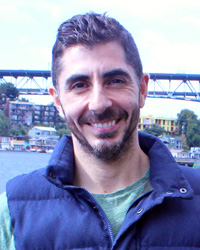Exploring Our Watery World at UW’s Aquatic Science Open House

On May 4th, the University of Washington held its second annual Aquatic Science Open House, inviting Seattle-area families, students, and teachers to explore the institution’s marine and freshwater science programs. The event was organized by the Students Explore Aquatic Sciences (SEAS) outreach group based in the School of Aquatic and Fishery Sciences (SAFS) and the Academic and Recreational Graduate Oceanographers (ARGO) outreach group based in the School of Oceanography.
Read moreArsenic-breathing life discovered in the tropical Pacific Ocean

“We’ve known for a long time that there are very low levels of arsenic in the ocean,” said co-author Gabrielle Rocap, a UW professor of oceanography. “But the idea that organisms could be using arsenic to make a living — it’s a whole new metabolism for the open ocean.”
Read moreJosé M. Guzmán receives UW Distinguished Teaching Award

José M. Guzmán, Acting Instructor within the School of Aquatic and Fishery Sciences, is one of this year’s seven recipients of the University of Washington’s Distinguished Teaching Award.
Read moreUW instructors get out of their comfort zone and adopt classroom technologies to enhance the student learning experience

Marine biology instructor José Guzmán flipped his classroom; upending the traditional way of teaching and learning, with instructors delivering lectures online so students can learn outside the classroom at their own pace and time. More interactive activities, such as tackling case studies, move into the classroom, allowing students to work together and with the instructor to solve problems. Video has become a key tool to deliver important material outside the classroom, which had been previously done in a lecture format.
Read moreTide Bites: A Unique Challenge: Marine Subtidal Ecology at UW Friday Harbor Labs

“Tide Bites” is the monthly newsletter of UW Friday Harbor Laboratories. This month, two of the instructors of the Marine Subtidal Ecology course Dive Officer Pema Kitaeff and Dr. Alex Lowe write about what it takes to be a scientific diver at the University of Washington. This course is currently scheduled to be offered in the summer of even years (the next offering will be summer 2020) at Friday Harbor Labs, and interested students are encouraged to contact the Marine Biology Adviser for more information.
Read moreUW News: Threatened tropical coral reefs form complex, ancient associations with bacteria, researchers say

When it comes to the well-being of coral reefs, for many years scientists focused on bleaching, an event that can endanger corals and the diverse marine ecosystems that they support. In bleaching, high temperatures or other stressors cause corals to expel Symbiodinium, the beneficial, brightly colored microbes that would normally share excess energy and nutrients with corals. Bleaching ultimately starves corals and endangers the entire reef ecosystem.
But over the last two decades, scientists have realized that other microbes are also critical for coral health, including communities of bacteria that live on coral surfaces and in their tissues. These bacteria constitute the coral microbiome. High temperatures — even below the threshold for bleaching — can disrupt coral microbiomes, leaving corals vulnerable to disease.
Read moreUniversity of Washington Announces New Marine Biology Major
Uniquely positioned in the region, the University of Washington (UW) has established itself as a world-leader in the fields of Oceanography and Aquatic and Fishery Sciences. The UW is thrilled to announce that it will be expanding the scope of its marine science offerings to include a Bachelor of Science (B.S.) in Marine Biology. While students could minor in Marine Biology, this is the first time it will be offered as a major at the UW.
Read more[Tide Bites]: Pygmy Seahorses – Little Fish With a Big Impact

“Tide Bites” is the monthly newsletter of UW Friday Harbor Laboratories. This month, FHL guest researcher Graham Short discusses his research in Adam Summers’ lab on pygmy seahorses.
Read more[Tide Bites]: River Otters in a Land Without Rivers

“Tide Bites” is the monthly newsletter of UW Friday Harbor Laboratories. This month, outgoing FHL Postdoctoral Fellow Dr. Brent Hughes discusses his research on river otters. Read a short excerpt below, or read the full story at: http://depts.washington.edu/fhl/tidebites/Vol61/index.html. Dr. Hughes talks about his work with three undergraduates working under ‘Doris Duke Conservation Fellowships’. Undergraduates from UW or any school are invited to learn more about this summer opportunity at http://uwconservationscholars.org/.
Read more[UW IT Connect]: Hacking the ocean’s mysteries

A vast underwater network of systems and sensors are capturing rich, never-before-accessed data from the mysterious world beneath our oceans.
To build a stronger community of scientists using that data to make new discoveries, oceanographers will convene at the UW for Oceanhackweek, August 20-24, 2018, five intensive days of collaborative investigations and tutorials in modern data analysis tools and techniques.
Read more